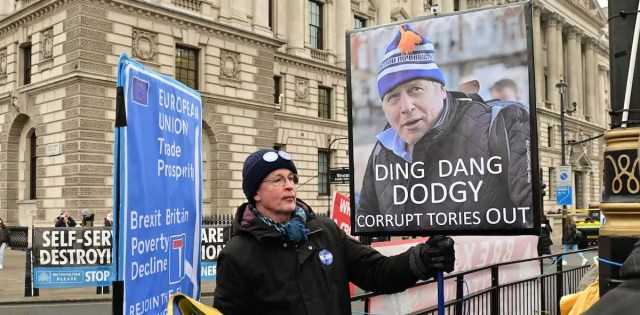UK slides in corruption perception index after series of political scandals
The UK is perceived to be more corrupt than it was following the 2009 expenses scandal that rocked parliament to its core
The UK has fallen down Transparency International’s corruption perceptions index (CPI) after a year of high-profile government scandals.
The CPI is not a measure of corruption itself but a measure of how much corruption is perceived to exist across a country’s public sector. For the UK government, already focusing very much on the next general election amid multiple scandals, perception matters.
 See Li/Picture Capital / Alamy
See Li/Picture Capital / Alamy
out of 100 in a measure that includes data from the Economist Intelligence Unit, various international risk guides, the World Economic Forum and the World Justice Project’s rule of law index. This has meant it has dropped from 11th place on a list of 180 countries and territories to 18th.
The UK is now at its lowest score since comparable data became available in 2011. That year, the UK scored 74 out of 100 and that was fresh off the back of the most significant expenses scandal of modern times. The current low score relates to a set of problems that are both more profound and more worrying.
The steady stream of incidents suggesting a loss of integrity within successive Conservative administrations are prima facie evidence of a problem. There is an ethics issue at the heart of UK government and that issue needs addressing. Former party chairman Nadhim Zahawai’s recent fine for failing to pay his taxes is an obvious case in point. The case of Conservative peer Michelle Mone and the profits her companies were able to make from having access to a “VIP lane” for providing PPE equipment during the pandemic is another. That’s not to mention the whole range of ethics-related scandals that hit when Boris Johnson was prime minister.
As things stand, there is little coming out of Downing Street and the UK parliament to illustrate that this problem has been clearly understood. On entering Number 10, Rishi Sunak was quick to proclaim that he wanted to bring integrity, professionalism and accountability back to public life. Yet he was slow to act on Zahawi and his appointment of Laurie Magnus to be his less-than-independent ethics officer has failed to change the tone.
As my colleague Sam Power has argued, many people factored in ethics indiscretions when Boris Johnson was PM – they don’t with Sunak. And that makes the issue potentially even more dangerous for the current prime minister.
Global Britain
Away from the corridors of Westminster, the UK’s friends and allies are watching. They may not say so in public, but many are appalled at the behaviour of some within and around government. They recognise the problem in a way that those at the top of UK government do not appear to do. This will, over time and often in discreet ways, affect investment decisions and the UK’s general standing in the international community.
And as well as countries that are ostensibly close to the UK and wish it well, hostile states are happy to watch the UK move away from core liberal democratic principles. As long as powerful UK actors play fast and loose with the law and due process – and fail to embrace transparency, accountability and integrity as good things in and of themselves – then states that don’t wish the UK so well will feel emboldened to pursue their own interests at the UK’s expense. Russian money will continue to find its way into London and rogues the world over feel emboldened in using the UK’s financial services sector to get what they want.
Red flag
The CPI is, of course, far from the only way to try to measure corruption. It’s also important to remember that the data on which the CPI is based is criticised for a range of reasons. For example, giving a country a single score between one and 100 can give a sense of false accuracy. China and Sao Tome & Principe both score 45 in the latest data yet the two countries are clearly facing very different sets of corruption challenges. Given that, what exactly does 45 actually mean? There are other issues, too.
But the CPI is good at pinpointing broader trends. The detail can be unpacked, but the bigger picture that’s painted is worth taking seriously.
The UK’s drop in the CPI should not be seen as a one-off event. It is a warning signal to a government that, for the sake of the country’s future wellbeing, it must do better.
The UK should not want to be a nation that suddenly wakes up to find that it’s in a new corruption reality that it spent too long trying not to recognise. It’s not too late to change that. But recognising the serious nature of the problem is the first task – and this data shows the task is pressing.
Daniel Hough,
Professor of Politics,
University of Sussex
Mauritius Times ePaper Friday 10 February 2023
An Appeal
Dear Reader
65 years ago Mauritius Times was founded with a resolve to fight for justice and fairness and the advancement of the public good. It has never deviated from this principle no matter how daunting the challenges and how costly the price it has had to pay at different times of our history.
With print journalism struggling to keep afloat due to falling advertising revenues and the wide availability of free sources of information, it is crucially important for the Mauritius Times to survive and prosper. We can only continue doing it with the support of our readers.
The best way you can support our efforts is to take a subscription or by making a recurring donation through a Standing Order to our non-profit Foundation.
Thank you.




